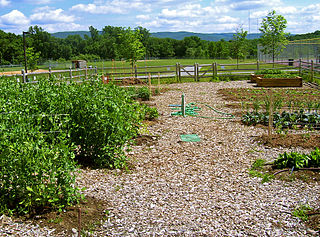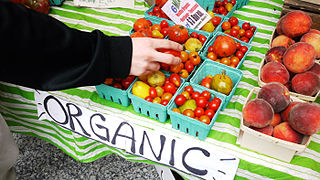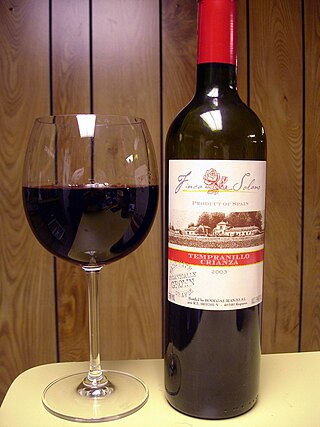The National Association for Sustainable Agriculture, Australia (NASAA) is an Australian and international organic certifying agency and trade association, located in Stirling, South Australia.
Contents

The National Association for Sustainable Agriculture, Australia (NASAA) is an Australian and international organic certifying agency and trade association, located in Stirling, South Australia.

Formed in 1986, the National Association for Sustainable Agriculture, Australia (NASAA) is a non-profit membership based association, whose charter is "to support the education of industry and consumers on organic, biodynamic and sustainable agricultural practices". [1] The scope of NASAA's standard covers the organic supply chain, including input manufacturers, producers, processors, and wholesale and retail operations. NASAA was the first organic certification entity in Australia, [1] it was also one of the first certifiers in the world to be accredited by the International Federation of Organic Agriculture Movements (IFOAM). [2] It certifies production and processing operations in 10 countries globally, including Australia, Indonesia, Malaysia, Nepal, Papua New Guinea, Samoa, Singapore, Solomon Islands, Sri Lanka, and USA. [3]
NASAA offers organic certification to a number of Australian and international standards via its certification arm NASAA Certified Organic (NCO). [4] NCO is nationally audited and accredited under the Australian Department of Agriculture and Water Resources (DAWR) Organic and Bio-dynamic Program. [5]
NCO is also accredited by the United States Department of Agriculture (USDA) to carry out organic certification services under that country’s National Organic Program (NOP), [6] and by the Ministry of Agriculture, Forestry and Fisheries (Japan) to offer certification to operators who are compliant with the Japanese Agricultural Standard (JAS). [7]
IFOAM accredited NCO in seven categories of organic certification: Aquaculture, Certification Transference, Crop production, Grower groups, livestock, Processing and handling, and Wild products. [2]

Organic farming, also known as ecological farming or biological farming, is an agricultural system that uses fertilizers of organic origin such as compost manure, green manure, and bone meal and places emphasis on techniques such as crop rotation and companion planting. It originated early in the 20th century in reaction to rapidly changing farming practices. Certified organic agriculture accounts for 70 million hectares globally, with over half of that total in Australia. Organic farming continues to be developed by various organizations today. Biological pest control, mixed cropping, and the fostering of insect predators are encouraged. Organic standards are designed to allow the use of naturally-occurring substances while prohibiting or strictly limiting synthetic substances. For instance, naturally-occurring pesticides such as pyrethrin are permitted, while synthetic fertilizers and pesticides are generally prohibited. Synthetic substances that are allowed include, for example, copper sulfate, elemental sulfur, and ivermectin. Genetically modified organisms, nanomaterials, human sewage sludge, plant growth regulators, hormones, and antibiotic use in livestock husbandry are prohibited. Organic farming advocates claim advantages in sustainability, openness, self-sufficiency, autonomy and independence, health, food security, and food safety.

The following outline is provided as an overview of and topical guide to organic gardening and farming:
Vegan organicagriculture is the organic production of food and other crops with minimal animal inputs. Vegan organic agriculture is the organic form of animal-free agriculture.

The organic movement broadly refers to the organizations and individuals involved worldwide in the promotion of organic food and other organic products. It started during the first half of the 20th century, when modern large-scale agricultural practices began to appear.

Organic certification is a certification process for producers of organic food and other organic agricultural products, in the European Union more commonly known as ecological or biological products. In general, any business directly involved in food production can be certified, including seed suppliers, farmers, food processors, retailers and restaurants. A lesser known counterpart is certification for organic textiles that includes certification of textile products made from organically grown fibres.
IFOAM – Organics International is a worldwide organization advocating for organics, with over 700 affiliates in more than 100 countries and territories.
Biodynamic agriculture is a form of alternative agriculture based on pseudo-scientific and esoteric concepts initially developed in 1924 by Rudolf Steiner (1861–1925). It was the first of the organic farming movements. It treats soil fertility, plant growth, and livestock care as ecologically interrelated tasks, emphasizing spiritual and mystical perspectives.

The National Organic Program (NOP) is the federal regulatory framework in the United States of America governing organic food. It is also the name of the United States Department of Agriculture (USDA) Agricultural Marketing Service (AMS) program responsible for administering and enforcing the regulatory framework. The core mission of the NOP is to protect the integrity of the USDA organic seal. The seal is used for products adhering to USDA standards that contain at least 95% organic ingredients.

The Organic Crop Improvement Association (OCIA) is a member-owned, non-profit organization, which provides research, education and certification services to organic growers, processors and handlers around the world. OCIA certifies and verifies farm, livestock, processor/handlers, broker-traders, Community Grower Groups (CGGs), and Private Labels to various programs.
Quality Assurance International (QAI) is a U.S.-based international organic certification company that is authorized by the United States Department of Agriculture (USDA) as "a USDA-accredited certifying agent that operates globally to certify organic operations to National Organic Program standards." It is a for-profit corporation, established in 1989, and headquartered in San Diego, California. It is one of the world's largest certifiers, operating in the United States, Canada, Latin America, European Union, and Japan.

California Certified Organic Farmers (CCOF) is a United States Department of Agriculture (USDA)-accredited organic certifying agency and trade association, located in Santa Cruz, California. Formed in 1973, CCOF was the first organic certification entity in the United States.

Traditional farming was the original type of agriculture, and has been practiced for thousands of years. All traditional farming is now considered to be "organic farming" although at the time there were no known inorganic methods. For example, forest gardening, a fully organic food production system which dates from prehistoric times, is thought to be the world's oldest and most resilient agroecosystem. The industrial revolution introduced inorganic methods, most of which were not well developed and had serious side effects. An organic movement began in the 1940s as a reaction to agriculture's growing reliance on synthetic fertilizers and pesticides. The history of this modern revival of organic farming dates back to the first half of the 20th century at a time when there was a growing reliance on these new synthetic, non-organic methods.

Oregon Tilth is an American nonprofit membership organization advocating organic food and farming, based in Corvallis, Oregon. Oregon Tilth's purpose is to educate gardeners, farmers, legislators, and the general public about sustainable growing practices that promote soil health, conserve natural resources, and prevent environmental degradation while producing a clean and healthful food supply.

Organic wine is wine made from grapes grown in accordance with the principles of organic farming, which excludes the use of artificial chemical fertilizers, pesticides, fungicides, and herbicides.

Organic farming is practiced around the globe, but the markets for sale are strongest in North America and Europe, while the greatest dedicated area is accounted for by Australia, the greatest number of producers are in India, and the Falkland Islands record the highest share of agricultural land dedicated to organic production.

Organic food, ecological food, or biological food are foods and drinks produced by methods complying with the standards of organic farming. Standards vary worldwide, but organic farming features practices that cycle resources, promote ecological balance, and conserve biodiversity. Organizations regulating organic products may restrict the use of certain pesticides and fertilizers in the farming methods used to produce such products. Organic foods are typically not processed using irradiation, industrial solvents, or synthetic food additives.
The Organic Foods Production Act of 1990 (OFPA) authorizes a National Organic Program (NOP) to be administered by USDA's Agricultural Marketing Service (AMS). The program is based on federal regulations that define standard organic farming practices and on a National List of acceptable organic production inputs. Private and state certifiers visit producers, processors, and handlers to certify that their operations abide by the standards. Once certified, these operations may affix the USDA Organic Seal. USDA has established four distinct categories for labeling organic products—100 percent organic, organic, "made with" organic ingredients, and specific organic ingredients—and only 100 percent organic and organic categories can use the USDA Organic Seal. It is illegal for anyone to use the word "organic" on a product if it does not meet the standards set in the law and regulations. The regulations under the OFPA are intended to set uniform minimum standards for organic production. However, states may adopt additional requirements after review and approval by USDA. AMS re-accredits certifying agents every 5 years, maintains federal oversight to assure truth in labeling, and provides assurance that imported organic products have been produced under standards that are equivalent to the U.S. standards.

Organic farming in New Zealand dates from 1930 and began on a commercial scale in the 1980s. It has gained importance within the farming market, particularly with the recent involvement of larger companies, such as Wattie's.
Participatory Guarantee Systems (PGS), as defined by IFOAM, are "locally focused quality assurance systems. They certify producers based on active participation of stakeholders and are built on a foundation of trust, social networks and knowledge exchange." They represent an alternative to third party certification, especially adapted to local markets and short supply chains. They can also complement third party certification with a private label that brings additional guarantees and transparency. PGS enable the direct participation of producers, consumers and other stakeholders in:
Organic aquaculture is a holistic method for farming fish and other marine species in line with organic principles. The ideals of this practice established sustainable marine environments with consideration for naturally occurring ecosystems, use of pesticides, and the treatment of aquatic life. Managing aquaculture organically has become more popular since consumers are concerned about the harmful impacts of aquaculture on themselves and the environment.